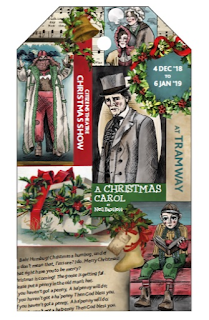The man who invented Christmas
This year, the Citizens Theatre is bringing back audience favourite A Christmas Carol. The five star production captures the inventive and uplifting spirit of Dickens' original novella. Here, we take a look at how the author has shaped the modern Christmas.
Charles Dickens’ famous festive stories have influenced many of our favourite Christmas traditions. In fact, the author was so closely associated with the holiday season that when he died in 1870 a young girl in London was overheard saying, “Mr. Dickens dead? Then will Father Christmas die too?”
Charles Dickens’ famous festive stories have influenced many of our favourite Christmas traditions. In fact, the author was so closely associated with the holiday season that when he died in 1870 a young girl in London was overheard saying, “Mr. Dickens dead? Then will Father Christmas die too?”
 |
| Portrait of Charles Dickens (C) Public Domain via Wikipedia |
At the start of the Victorian era Christmas festivities were in decline in Britain. The hardships of the industrial revolution meant few had enough time or money to celebrate and many businesses did not even consider it a holiday. Dickens’ seasonal stories, such as The Chimes and The Cricket on the Hearth, helped reignite Christmas traditions and led London’s Sunday Telegraph to declare Dickens ‘the man who invented Christmas!’
It was his beloved tale A
Christmas Carol, however, that really
captured the nation’s imagination as the story’s focus on charity, compassion
and the importance of family brought a new meaning to Christmas in the
Victorian era. First published on 19 December 1843, the book was so popular it had had sold out by Christmas Eve.
 |
| First edition of A Christmas Carol (C) Public Domain via Wikipedia |
The language of the story is so well known that it has crept into our conversations. A ‘scrooge’ is someone that is tight with money and the exclamation ‘Bah! Humbug!’ can be used to retort anything overly sentimental. Even the phrase ‘Merry Christmas’ was popularised by A Christmas Carol - it appears 21 times in the book!
 |
| The Ghost of Christmas Present (C) Public Domain |
It’s also because of Dickens that we all hope for snow on the 25th December as the author persistently depicted frosty scenes with snow-carpeted streets. Dickens’ biographer Peter Ackroyd notes that Dickens’ childhood coincided with the coldest decade in Britain since the 1690s and suggests that it is this historic coincidence that has influenced the ideal of the white Christmas.
Today, over 175 years later, A
Christmas Carol continues to be as relevant as ever, sending a heartening
message that cuts through the materialistic trappings of the season and leaves
all rejoicing in the Christmas spirit.
 |
| Our festive mailing in 2018 was inspired by Dickensian Christmas traditions |
We hope you’ll come and celebrate the festive season with us at Tramway – and enjoy a heart-warming production of everyone’s favourite
Christmas story!
A Christmas Carol
runs 3 - 24 Dec 2021. BOOK NOW!

Comments